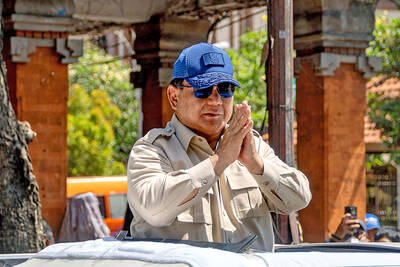The Philippines ordered troops and police on heightened alert yesterday after a restaurant attack killed six in its southern Mindanao Island, but said there were no clues yet to the culprits.
Philippine Secretary of the Interior Mar Roxas said investigators were reconstructing the bomb site to gather more clues on Friday night’s attack in Cagayan de Oro, a relatively peaceful city in Mindanao, where various rebel groups and armed gangs operate.
“We are doing everything [to determine the suspects]. We have placed the police in Mindanao, the intelligence community and the army on heightened alert to prevent a similar attack,” Roxas said on DZBB radio.
Investigators have yet to determine the explosive used in the attack, which hit a bistro packed with at least 100 people. Most were doctors and pharmaceutical representatives who had just attended a national convention at a nearby hotel.
Forty-eight others were wounded in the blast, police said.
Contrary to earlier reports, Roxas said investigators had not found shrapnel or metal fragments at the blast site, which would have indicated an explosive device made from a mortar bomb.
“According to the doctors who did the autopsy report, there were no shrapnel that can be attributed to a grenade explosion,” Roxas said. “It is also not an IED [improvised explosive device] made from mortar or artillery shell.”
Ordnance experts have found wires and a battery that could have been used as a trigger but not much else.
Roxas’ statement suggested the attack may not have been the work of Muslim militants who operate in other parts of the south and are known to use mortar bombs rigged to a timing device.
Asked whether investigators were looking at any specific group behind the blast and what the motive could be, he said: “If it’s business rivalry, fighting over land, or terrorism we could not say yet until we know all the facts and details.”
Cagayan de Oro is a bustling city that has been relatively unscathed by a decades-old Muslim and communist insurgency that have plagued parts of the south in this largely Catholic country.
The Moro Islamic Liberation Front, the country’s largest Muslim insurgent force, yesterday said it had no forces operating near Cagayan de Oro and condemned the attack as un-Islamic.
The militant group, which is negotiating a peace deal with Manila, was also willing to help track down the perpetrators if asked to do so by the government, said Ghazali Jaafar, the group’s vice chairman for political affairs.
“We have an existing agreement to help each other out in interdicting criminal elements,” Jaafar said.

DEADLOCK: Putin has vowed to continue fighting unless Ukraine cedes more land, while talks have been paused with no immediate results expected, the Kremlin said Russia on Friday said that peace talks with Kyiv were on “pause” as Ukrainian President Volodymyr Zelenskiy warned that Russian President Vladimir Putin still wanted to capture the whole of Ukraine. Meanwhile, US President Donald Trump said that he was running out of patience with Putin, and the NATO alliance said it would bolster its eastern front after Russian drones were shot down in Polish airspace this week. The latest blow to faltering diplomacy came as Russia’s army staged major military drills with its key ally Belarus. Despite Trump forcing the warring sides to hold direct talks and hosting Putin in Alaska, there

North Korea has executed people for watching or distributing foreign television shows, including popular South Korean dramas, as part of an intensifying crackdown on personal freedoms, a UN human rights report said on Friday. Surveillance has grown more pervasive since 2014 with the help of new technologies, while punishments have become harsher — including the introduction of the death penalty for offences such as sharing foreign TV dramas, the report said. The curbs make North Korea the most restrictive country in the world, said the 14-page UN report, which was based on interviews with more than 300 witnesses and victims who had

COMFORT WOMEN CLASH: Japan has strongly rejected South Korean court rulings ordering the government to provide reparations to Korean victims of sexual slavery The Japanese government yesterday defended its stance on wartime sexual slavery and described South Korean court rulings ordering Japanese compensation as violations of international law, after UN investigators criticized Tokyo for failing to ensure truth-finding and reparations for the victims. In its own response to UN human rights rapporteurs, South Korea called on Japan to “squarely face up to our painful history” and cited how Tokyo’s refusal to comply with court orders have denied the victims payment. The statements underscored how the two Asian US allies still hold key differences on the issue, even as they pause their on-and-off disputes over historical

CONSOLIDATION: The Indonesian president has used the moment to replace figures from former president Jokowi’s tenure with loyal allies In removing Indonesia’s finance minister and U-turning on protester demands, the leader of Southeast Asia’s biggest economy is scrambling to restore public trust while seizing a chance to install loyalists after deadly riots last month, experts say. Demonstrations that were sparked by low wages, unemployment and anger over lawmakers’ lavish perks grew after footage spread of a paramilitary police vehicle running over a delivery motorcycle driver. The ensuing riots, which rights groups say left at least 10 dead and hundreds detained, were the biggest of Indonesian President Prabowo Subianto’s term, and the ex-general is now calling on the public to restore their